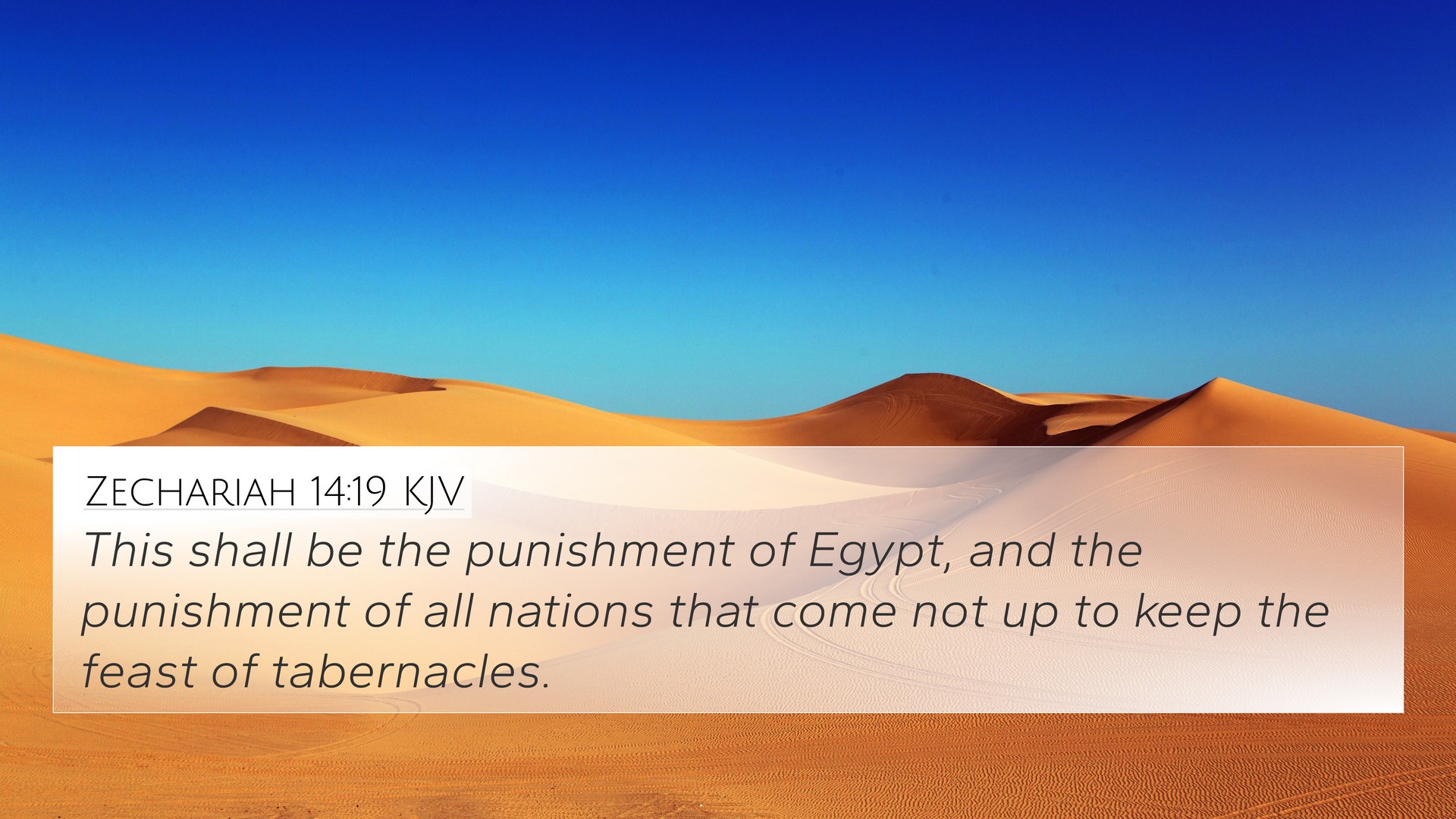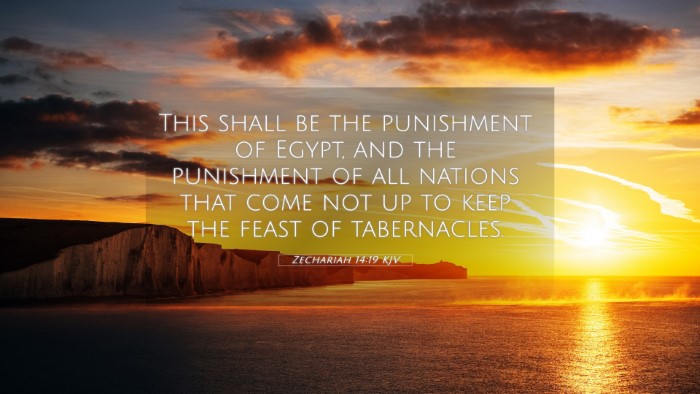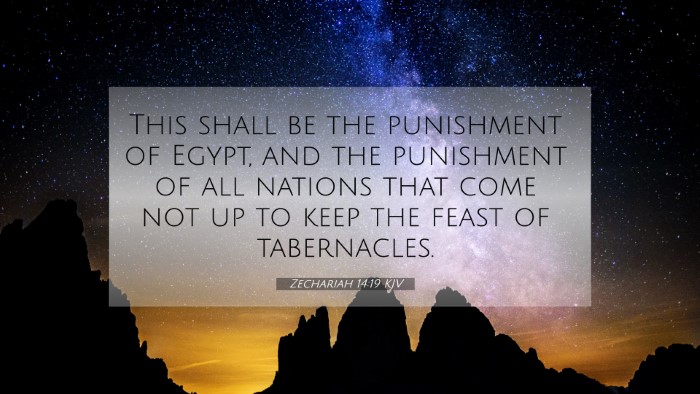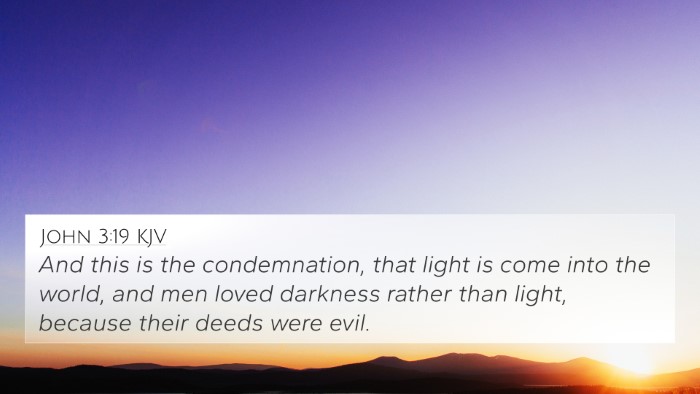Understanding Zechariah 14:19
Zechariah 14:19 states: "This shall be the punishment of Egypt, and the punishment of all nations that come not up to keep the feast of tabernacles."
Commentary Insights
The verse invites us to explore God's judgment and the importance of worship within the context of His covenant community. Considering insights from various public domain commentaries such as Matthew Henry, Albert Barnes, and Adam Clarke, we find a rich tapestry of meanings.
Matthew Henry’s Commentary
Henry notes that this passage emphasizes the serious consequences for nations that fail to engage in the significant religious practices ordained by God. The Feast of Tabernacles, also known as Sukkot, symbolizes God's provision and protection over Israel during their wilderness journey. Thus, neglecting to keep this feast is indicative of rejecting God's sovereignty and care, resulting in divine punishment.
Albert Barnes’ Commentary
Barnes elaborates on the prophetic implications of Zechariah's words. He suggests that this prophecy pertains not only to the historical context of Israel's restoration but also extends to a future eschatological fulfillment where nations will recognize the Lord's authority. The annual observance of the Feast of Tabernacles illustrates the universal acknowledgment of God's reign, and failure to comply brings forth a reminder of judgment across nations.
Adam Clarke’s Commentary
Clarke discusses the Feast of Tabernacles as a time for all nations to honor the Lord. He highlights that the refusal of any nation to participate symbolizes a broader rejection of God's influence. Clarke emphasizes that such neglect is met with consequences—a theme that resonates throughout biblical texts regarding God's expectations for His creation and the natural order established through covenantal relationships.
Interpretive Framework
The implications of Zechariah 14:19 are profound in exploring themes such as:
- Judgment of Nations: The idea that nations are accountable to God serves as a foundational understanding in both the Old and New Testaments.
- Universal Worship: The invitation for all nations to participate in the Feast underscores a vision of unity under divine authority.
- Covenantal Faithfulness: Reflecting on how faithfulness to God's commands aligns with blessings, while negligence leads to punishment.
- Historical Context: Examining how this verse relates to the Israelites' historical experience and their covenantal identity.
Bible Cross-References
To deepen the understanding of Zechariah 14:19, the following Bible verses provide meaningful connections:
- Exodus 23:14-17: Highlights the importance of annual feasts and national obligations to God.
- Leviticus 23:33-43: Details the specific observances tied to the Feast of Tabernacles.
- Isaiah 66:23: Prophecies that all flesh will come to worship before the Lord.
- Joel 3:16-17: Speaks to God's judgment upon nations, correlating with the response to His command.
- Malachi 1:11: Affirms that God's name will be great among the nations, which ties into the universal worship aspect.
- Matthew 28:19-20: Christ's commission to the nations reflects the ongoing importance of worship and obedience.
- Revelation 21:24: Where the nations walk in the light of the Lamb points to the eschatological fulfillment of God's promise.
- Romans 14:10-12: Addresses accountability before God, echoing the weight of obedience and worship.
- John 4:21-24: Discusses true worship and spirit and truth, which can be linked to prophetic expectations.
- Isaiah 2:2-3: Envisions all nations coming to the mountain of the Lord, reminiscent of the call to the Feast of Tabernacles.
Bible Verse Connections
This verse showcases vital connections between themes of God's sovereignty, human accountability, and divine worship that resonate across various biblical texts. Understanding such relationships not only enhances individual interpretation but also expands the communal identity of the faith community.
Thematic Bible Verse Connections
- The importance of worship: Embodied in other feasts (Deuteronomy 16:16).
- God's desire for all nations: Seen in prophetic texts (Zephaniah 3:9).
- Consequence of neglect: Echoed in the Parables (Luke 19:26).
Practical Applications
For modern readers, Zechariah 14:19 serves as a reminder of the divine expectations placed upon believers and nations alike. It encourages personal and communal faithfulness, tangible expressions of worship, and an awareness of the implications that neglecting God’s commands might bring.
In our approach to Scripture, utilizing tools for Bible cross-referencing can illuminate the interconnectedness of biblical themes. By engaging in cross-reference Bible study, one can discover how various verses inform and enhance understanding of a single passage, creating a rich tapestry of divine truth.
In conclusion, Zechariah 14:19 is not merely a historical admonition but a prophetic exhortation leading believers to recognize the weight of worship and the essential nature of obedience in their walk with God.



